It’s Time to Talk. Not just today, but every day
by David Best, SSW Counsellor
The 1st of February is Time to Talk day, an annual awareness day designed to encourage us all to start a conversation about mental health.
Having lived with a visual impairment for most of my life, I understand and have experienced many of the issues caused by and related to sight loss.
Many people feel alone and isolated, partly because it is difficult for those around them to understand what they are going through.
Loss of any kind can be a difficult process and although there are common factors, it is a unique experience for each individual person.
With all loss comes change and for those experiencing sight loss there are many practical adjustments to make. These can be extremely challenging and exhausting, made more difficult and complicated by the emotional impact.
It can feel difficult to share thoughts and feelings with the people we are closest to including family members, friends, and colleagues. People often worry that others will feel burdened by their problems or that they might not understand. Often people experience feelings of frustration and anger and don’t want those around them to witness these for fear of being judged.
At Sight Support Worthing we recognise the importance of providing services that address and can support members with all aspects of their sight loss experience.
As part of our holistic approach, we provide a high quality, professional, confidential counselling service to support the emotional needs of our members.
The main aims are to encourage and enable members to explore, understand and express their thoughts, feelings, and behaviour by providing a confidential therapeutic relationship based on genuineness, acceptance, and trust. The counselling relationship provides the key to empowering members to develop and enhance skills, strategies, self-awareness, confidence, and resilience. Over time members will become better equipped to respond to, cope with and manage the issues and challenges that affect their lives therefore enhancing their self-esteem.
If you would like to find out more about this service and how you or a family member could benefit from our wellbeing service please contact either Kate Confrey, Wellbeing Services Coordinator or David Best, Counsellor on 01903 385025
We’re thrilled to announce Sight Support Worthing has been chosen to be part of the Co-op Local Community Fund.
Our round started on the 22nd October and will run for 12 months until 19th October 2024. During this time, Co-op Members will be able to choose us as their local cause to donate points to.
If you are a Co-op member or would like to be, and need helping to set it up, please let us know. If you have an online account with the Co-op you can nominate SSW as your chosen charity by logging into your account here.
We are delighted to announce that we have been awarded funding from Worthing Community Infrastructure Levy to put towards electric powered transport for our members. This will give our members greater access to our community, reduce isolation and enable us to increase the number of outings we offer. The funding will also help reduce SSW’s environmental impact and carbon footprint.
We are so pleased to see that our friends at Cycall Adapted Cycling have also received funding; we look forward to many more trips to their newly funded hub and sensory space.
It was a brilliant day. The sun shone. The bees buzzed. And SSW members got free hot drinks and doughnuts. Bob Smytherman, Worthing Town Crier and SSW President, dressed smartly in black hat and blue satin tunic, began official proceedings by ringing his town crier’s bell. ‘Oyez. Oyez,’ he cried. ‘Mr Mayor. Ladies and gentlemen. Boys and girls. Welcome to sunny Worthing for our amazing Sight Support Worthing’s Sensory Garden official launch.’ The Mayor, Jon Roser, dutifully cut the inaugural blue-ribbon to heartfelt applause.
The summer weather and a rainy July made sure the Sensory Garden, opposite the seafront, had bloomed. The kitchen herbs, like feisty cat mint, thyme, Jerusalem sage, rosemary, green ginger, and fennel grow vibrantly among household names like fuchsias, lavender, geraniums, poppies, and petunias. There’s plenty of exotic plants too, like amazon mist grass, mountain sandwort, and Babiana-Stricta, which you’re likely to know only if you’re green fingered. For those of you selecting the Sensory Garden as your Mastermind subject (or are just curious), we’ve included a comprehensive list of the featured plants below. One of the most sensory is the lemon balm mint (try rubbing it between your fingers), which bursts with a pungent zesty citrus. The herb has made a spirited second home for itself among the white stones around the fountain. The abundance of plants suggests replanting was easy but, as our before and after photos show, there was an awful lot for the team, spearheaded by SSW Chair of Trustees Cherry Ward, and Adur & Worthing Council to do.

In receipt of only basic maintenance for more than a decade, there were only a few shrubs growing back in 2019, when they began. The team retained some of the old plants, like the hebes in the rockery, the blue sea holly and two myrtle bushes, but the vast majority are new. The exposed location of the garden made planting a challenge. Some plants were chosen specifically, with an eye on the climate, because they’re drought tolerant. That’s not to say there weren’t a few surprise success stories. Some plants strongly expected to perish proved their mettle and thrived, like the foxgloves and hollyhocks. A bigger surprise was discovering that each plant needed a UK passport to prove it had lived in the UK for at least two years and didn’t harbour disease. So, all told, it was far from straightforward. And then there was a pandemic.
As a community garden the team are keen for people to take cuttings to use in their own green spaces. The bronze fountain at the garden’s centre takes the form of the Greek god Triton. Featuring the body of a man and the tail of a fish, he stands upright holding a fish wriggling in each hand. The fountain has been fitted by the Council with new pumps, which provide the tranquil sound of trickling water. One SSW member said it reminded them of children playing in the summer. Radiating outwards from the fountain towards the protective fence are railway sleepers imbedded in shards of slate, representing the hands of a clock. Each tip is labelled with a golden number for the appropriate hour. “The colour contrast,” remarked one SSW member, “marks out the different zones. It’s enclosed, but accessible, with no steps. It’s not just a green canvas, it has texture.” Cultivating variety has been the goal to create, said Cherry, “a place of interest and intrigue”. Playful and interactive elements are included, like the concealed cast stone snails in the rockery and the red spotted illuminating mushroom sculptures.

A spirit of collaboration has flourished with the plants. From the children on the first spring planting day running riot with handfuls of seeds, to the graft of SSW volunteers like Andrew, Jane and Barry, as well as the rangers, The Camps Coffee Co. who kindly donated our launch day refreshments, and the Rampion community grant won by our ace fundraiser, Jackie Brownlee; all have had a crucial part to play. The grant is commemorated by the eye-catching circular shaped and multicoloured ‘Wind Spinner’ windmill twirling in the breeze. If everything on display suggests the job is done, well you’re in for a surprise. The park benches are soon to be updated, more bulbs set to be planted, a new sound feature installed and areas are to be textured with bark from materials shredded by the rangers in other public gardens.
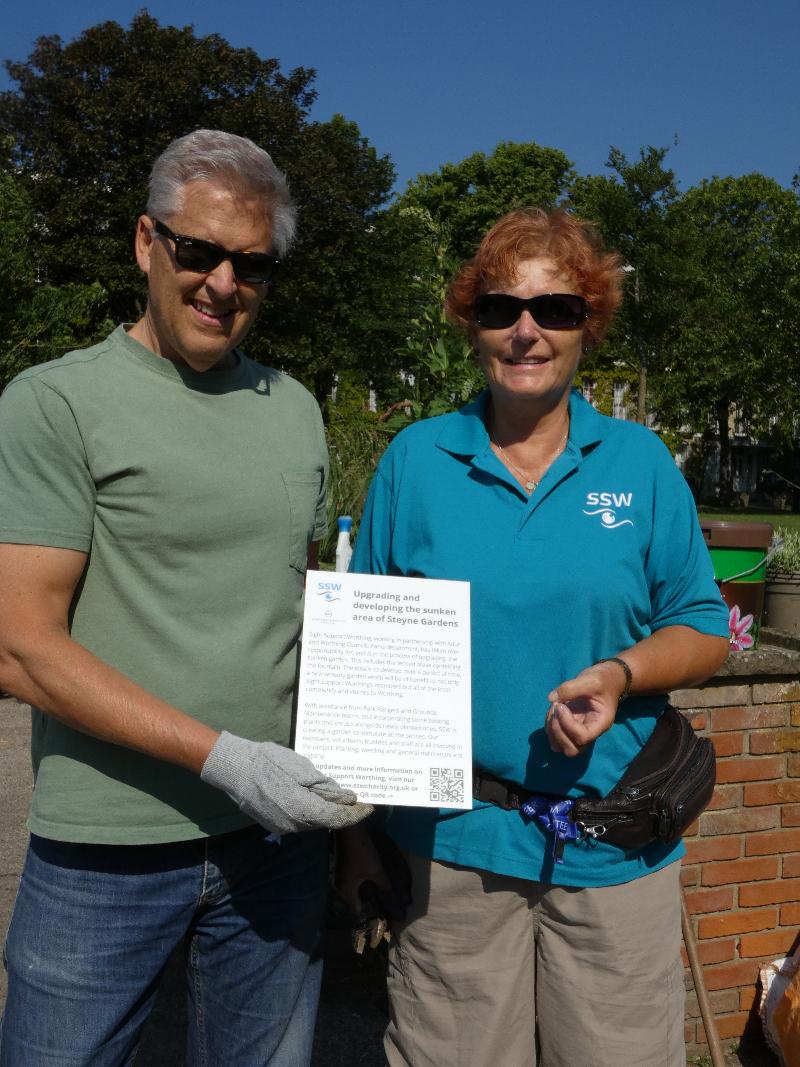
There’s plenty for wildlife too. Six willow, salix and acer trees have been planted in the raised brick outer borders as part of the Queen’s Green Canopy project. Add to that bird feeders for the winter, two wooden insect hotels (dubbed Buggingham Palace and Wingsor Castle), plants to attract butterflies and ‘beebombs’ for bees and you have a truly multidimensional garden. “Green spaces are so important for everyone at the moment,” said the mayor, casting a handful of seeds. ‘’It’s nice to see people working on it.’’ Work that is set to continue apace.
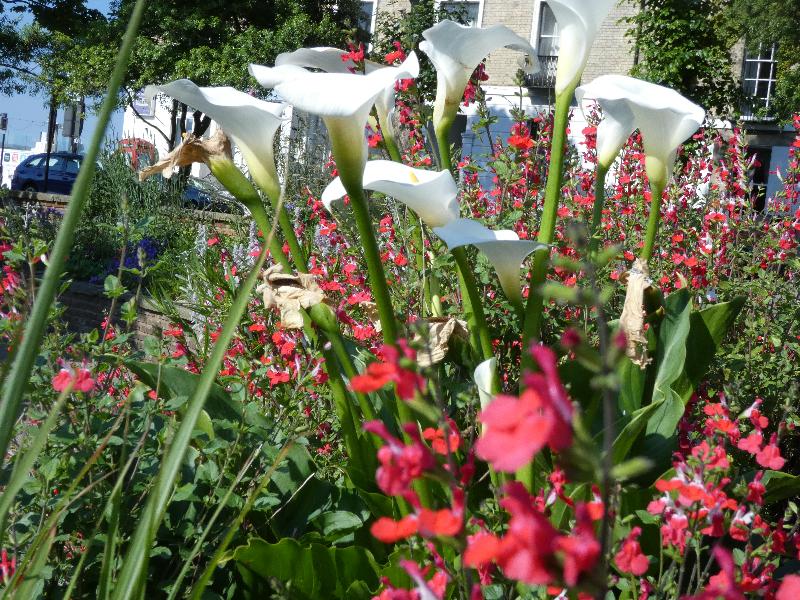
The Sensory Garden is permanently open. If you would like help visiting the garden, please call us on 01903 235782. We’d also love you to get involved with the maintenance of the garden. If you’d like to, please call us on the same number.
Further information
- The Triton fountain
- The Queen’s Green Canopy project
- Rampion offshore wind farm
- An A-Z of the plants in the garden
- Our feature length article in the Worthing Herald

Many of you will have either been aware of the work being undertaken on our sensory garden in Steyne Gardens or, perhaps, even been along to help us with a bit of weeding or planting.
We have been working in partnership with Adur and Worthing Councils Parks department to create a new sensory garden for you our members, local community and visitors to Worthing. A wonderful team of volunteers and members led by Cherry Ward have spent the past two years transforming the garden
We are excited to have an ‘official opening’ event on Tuesday 1st August, from 11am – 1pm.
All are welcome to come along, join in the celebrations and enjoy the experience the sensory garden offers. If you need transport, please get in touch to book.
—————————————————
A few words from our Chairperson Cherry…
Our intention was to create a space that would delight all the senses: sight, smell, touch, and even taste, albeit with caution. However, we have yet to produce any sounds besides the soothing water flowing from Neptune’s fountain. Countless tears of both pain and laughter were shed but, through perseverance, we successfully prepared the ground to plant new bulbs. The assistance of our young ones and a diverse array of plants made this possible. Creating a safe and inviting garden for both creatures and people. To further captivate visitors, we strategically placed Wingsor Castle, Bugingham Palace, and an enchanting wooded area.
Our project has been made possible thanks to a grant from Rampion.

We’re pleased to have launched our wellbeing service including counselling and coaching. For a confidential chat about how we can support you, please get in touch with our dedicated Wellbeing Services Coordinator Kate.
You can email Kate – wellbeing@sightsupportworthing.org.uk or telephone her on 01903 385025.
Join us on Tuesday 7th March from 6.30-8pm as experienced coach Sydney May leads a free session for people experiencing sight loss or who have been diagnosed with a vision impairment or degenerative vision.
In a relaxed group setting with others in similar circumstances, we’ll discuss techniques to support and deal with the trauma and uncertainty that comes with sight loss as you start your next chapter. We’ll cover topics such as:
- Worries, fears and hope
- Trying new things
- Assumptions about abilities
- Problem solving
- Learning from mistakes
- Acceptance
- Resilience
To register either call 01903 235782 or do it online here: https://www.eventbrite.co.uk/e/adjusting-to-sight-loss-tickets-523596720887
SSW recently welcomed a work experience student to the team: Ella, from Davison High School. Here’s her account of her time spent at SSW:
Hi, I’m Ella and I am a Year 10 student from Davison High School. I had my work experience placement at Sight Support Worthing, and I’ve written this to tell you all about my experience during the week. I arrived on Monday and got stuck in straight away, picking up different members on the SSW bus and taking them to Steyne Gardens to have a look at the renovation work the charity had been doing there (which looked great by the way!).
We then came back to the Centre for tea, coffee and cakes and then took everyone back home again. It was great to see everyone having a great time and catching up with each other and you could tell the services and activities that the charity holds benefit people greatly.
Also, during the week I learnt about and tested out some equipment designed to help visually impaired people with daily activities, such as the OrCam which magnets to the side of a pair of glasses and will photograph text and then read it out to the user. There were also the liquid level indicators that would make noises when the hot water going into a mug reached the right level, and the long cane that could sense when a hazard was approaching in front of the user. It was interesting to learn about these things and how technology is advancing to help visually impaired people in our society.
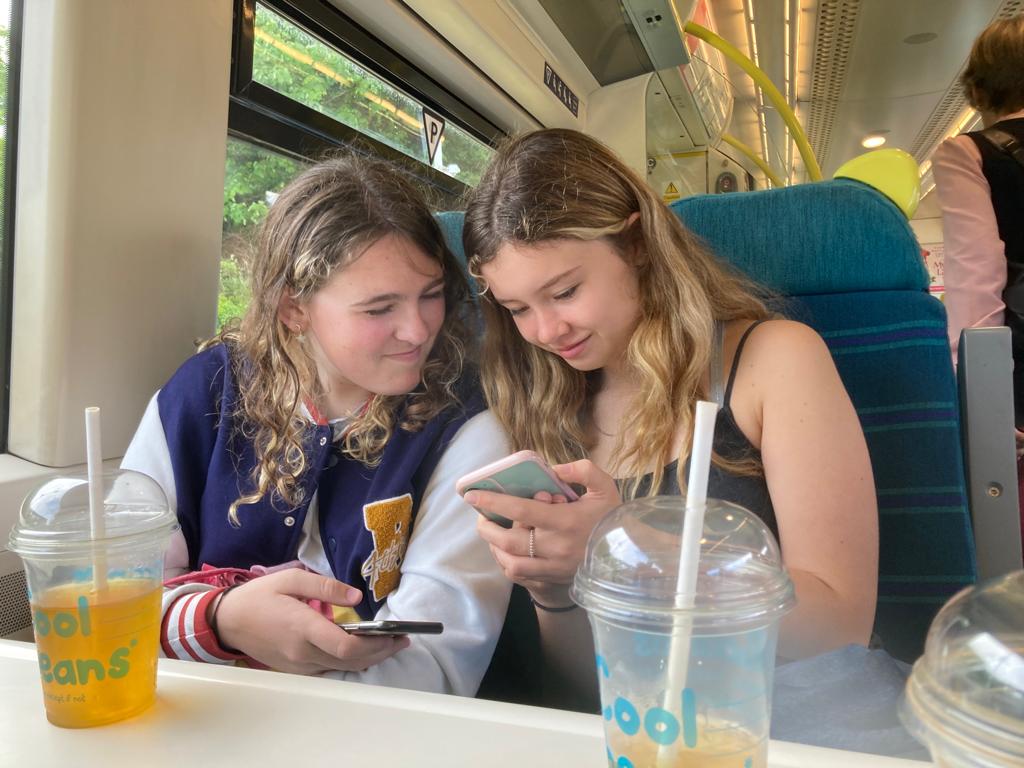
I also completed training so that I could become a qualified Level 1 Sighted Guide, which was a useful thing to complete as it means I am now able to lead a blind or severely visually impaired person confidently and accurately.
I learnt more about the different activities SSW offers, which seem varied and fun, such as the Cycall event I went to which is inclusive cycling that takes visually impaired people into consideration with their bike designs and allows them to have a easier cycling experience. It was great fun, and I was surprised at the speeds some of the members could cycle at – they were zooming past! Other events held by the charity include regular art classes, shooting, woodwork, water activities and even skydiving! They challenge peoples’ initial perceptions that visually impaired people may not be able to do certain activities, as members regularly partake in fun and unique events. I’ve learnt that there are a lot of different ways one can be visually impaired, and I’ve got to speak to different people with different capabilities and experiences, which was very eye-opening.
Overall, I had a great experience and got a good insight on what life is like for the visually impaired which was useful as it allows me to be more understanding of different people in the community. I was getting involved in different activities and talking to a range of people, volunteers and members alike, which showed me a different side to having a job. The staff and volunteers at SSW were very friendly and welcoming and made the experience a pleasant one. It was a great taster into life in the workplace and I would recommend it to anyone who wants to get involved in some fun activities and learn about the charity and how it helps people.
Thanks Ella; we’re glad you enjoyed your work experience with us!
by Ali Bates, SSW Tech Advisor
It’s Mental Health Awareness week and the theme this year is loneliness. Loneliness is something that one in four of us suffer with at some point in our life. Today I will share my own experience of dealing with loneliness after sight loss.
Six years ago I suffered a detached retina. It was completely unexpected. I woke up one day with slightly blurry vision in my right eye and didn’t really pay it any attention as my eyes would occasionally go blurry and correct themselves later in the day. On this occasion it did not fix itself and I ignored it. I happened to have a routine optician appointment booked in and it was during this that I got told my retina had detached and I should visit the eye clinic. Me being me, I left it a few days… I worked at the hospital at the time so I just called the eye clinic on my next shift. They demanded I came in to them immediately.
I had not expected that what was going on with my eye was an emergency that required urgent surgery. Unfortunately for me, the surgery was not a success. I woke up from the anaesthetic in complete darkness and excruciating pain. Nobody told me but I knew immediately that it had not been a success. The reality of sight loss had not previously occurred to me,
As part of my recovery I had to learn to sleep on my front and lay facedown for 80% of the day in order to give any chance to have some useable sight.
I existed like this for six weeks, in darkness and constant pain. My husband became my carer; he fed, bathed, did hourly eye drops and did everything in the house including looking after both of our children as well as me. For both of us it was incredibly lonely. I was bored, I wanted to read the news, see a friend and just feel normal and not like I was a burden on my husband.
One Saturday, a few weeks in, everything came to a head. I had only left the house for hospital appointments. My husband was physically and mentally exhausted from doing everything and dealing with the shock and uncertainty of my sight loss and inability to do anything. It was like the mental load had physically paralyzed him. We knew we needed some help from outside our four walls but this was not something either of us had ever sought before.
Monday morning my husband called the GP. He asked for help, he broke down, he felt like he had somehow failed as a husband. But, as I type this, I am literally sat here with tears in my eyes because I am so proud of him for recognising he needed some help. It was not failure; it was acceptance that he is human and there is only so much we can deal with on our own. During our entire relationship, every hurdle we have faced we have got through together, but he was so busy being everything to everyone else that he had nothing left for himself. Something had to give.
He had counselling; he was able to talk openly with someone that could help him adjust to our new normal, give him coping strategies and help him feel less alone. He felt able to tell me how he was feeling without feeling guilty, as the reality is that we both lost a lot more than an eye. It changed who we are and the dynamic of our relationship. It was a long recovery but as I adjusted to living without my right eye I was able to be his supportive and fun wife again.
My own mental health recovery took a lot longer. I was so determined to get back to normal and back to work, that I did not stop still and give myself time to make adjustments; I threw myself into everything. I was in denial and angry at the same time. Everyone around me was so busy telling me that I am so brave and what an inspiration I am, which only confused me further as some days my only achievement was getting out of the house to get the kids to school. I would then go home and sit in my house alone, hiding from the real world so no one could see how not ok I was. The short periods of time I was with others I could put my mask on and pretend all was ok.
It was actually our mortgage falling through nearly three years later that finally broke me, us buying our first home had been a focus for so long and at the last moment it was taken away from us. This rekindled my feelings of life being unfair and I went into a tailspin. All my focus went on finding us somewhere new to live and, thankfully, it only took 11 days to find somewhere and get moved in. But then I had a full breakdown. I could not hide from my feelings anymore. I didn’t want to take pills to numb the pain; I NEEDED to deal with everything so now it was my turn to reach out and ask a professional for help. I was lucky to be given a counsellor very quickly.
This lady changed my life. I worked through so much of the trauma I had been living with, accepted that I can still be me even with sight loss and, most importantly, I started to talk openly and honestly. It was not an overnight fix; it has been a long road of acceptance. I still have days of negative feelings but they do not control how I live my life or fill me with feelings of inadequacy. I definitely have many more positive interactions. I will always have a small amount of denial that I am blind but I know that is my stubbornness and determination to live my life on my terms.
I am sharing this as I know being open and honest with my experience may make others feel that they can ask for help. Here at Sight Support Worthing we are passionate about offering our members and their families the support they need. One of our future plans is to offer specialist talking therapy for those living with sight loss as well as their immediate family.
We are putting in a bid to the National Lottery to help fund this vital service. As part of the process we would like feedback from our community. Those of you on our mailing list (email and post) will have had a copy of the survey already. For those of you who have yet to complete it, you can find it here. It should take 3-5 minutes of your time and your feedback will be extremely valued. Thank you.
SSW has been awarded £600 from the Adur and Worthing Trust, as part of Creative Commissions 2022, for its Platinum Jubilee Community Art Project.
The aim of the project is to, as we emerge from the effects of the pandemic, find new ways to engage and connect with both our members and our local community. This project will achieve this objective by collaborating with local talented artists to produce art that will be on show to the public, enhance our neighbourhood, and also foster a good community spirit by celebrating the Queen’s Platinum Jubilee together.
The project includes a series of workshops and events using a variety of techniques and materials to produce large material banners and wire crowns that will be displayed for the public to see and enhance the local area, ready for the Platinum Jubilee celebrations.
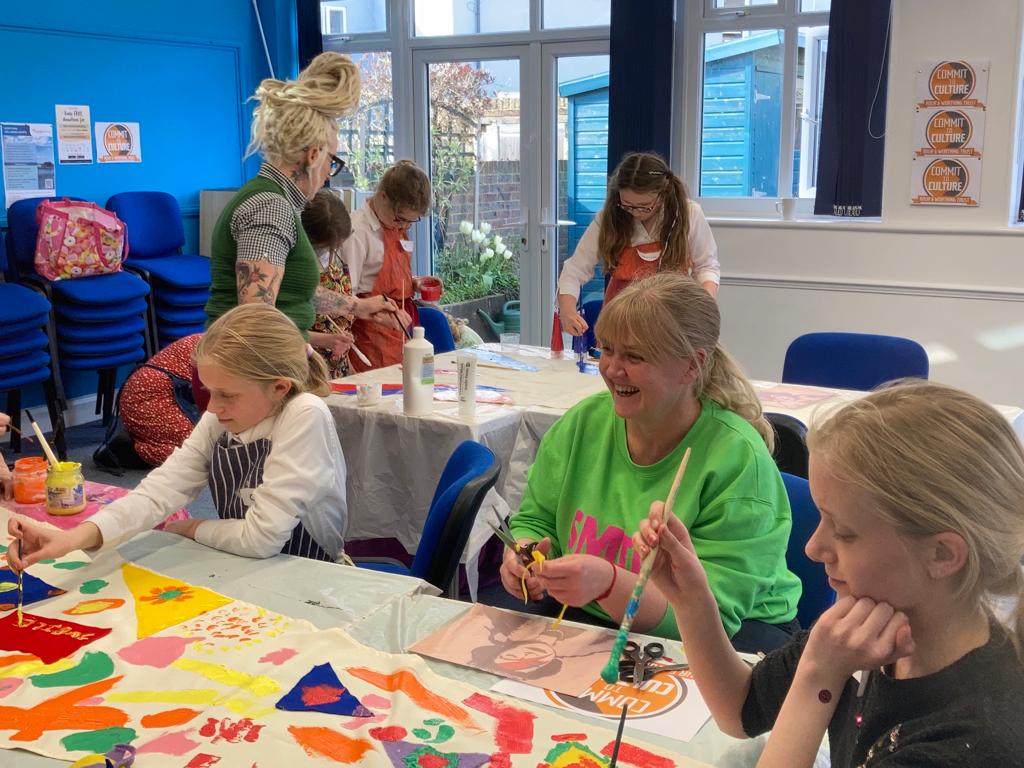
Our plan is to then host an afternoon tea in late May for the artists and everyone else who has participated in the project. This will be an opportunity to celebrate working together as well as the 70 years of her Majesty’s reign.
All events taking place as part of the Platinum Jubilee Community Art Project can be found on our calendar. Contact the Centre (01903 235782 or info@sswcharity.org.uk) to book a place on any of the events.
SSW has several partners in the project including Storm, Art-ful Pottery Cafe and the West End Gallery, all of whom are based near to SSW’s Centre in Rowlands Road. We’re also working with Fiona McVey and Jude Bitton of Inclusive Arts on this project, with Fiona being familiar to SSW members as our art teacher! It is hoped that the project will forge strong relationships between the partners and generate a feeling of community spirit.
The large, decorated banners created will be hung, prior to the Jubilee Bank Holiday weekend in June, on the metal posts positioned on both sides of Rowlands Road for everyone to enjoy. Large wire decorated crowns will also be made, at the organised workshops, and positioned securely on the top of the posts to add an extra dimension to the project.
We hope you can either join us for part of the project, or take a stroll down Rowlands Road later this Spring to admire the creations made by all involved!

James Langley joined the SSW team in late 2021 as our Events Coordinator and Accessibility Tester. He also works for Blatchington Court Trust as a Leisure Development Officer. Outside of work he has a busy life and enjoys socialising with his buddies, exploring on his mountain bike and honing his Judo skills.
James is visually impaired; he has nystagmus and ocular albinism. Spurred on by SSW team-mate Ali’s recent experiences with her eyes, James has recently asked to be referred to the eye clinic as it has been years since he has had any input from them. He’s aware that there may have been changes in his eyes or he could have even had unknown conditions develop.
Nystagmus presents itself as an involuntary movement of the eyes. In James’s case this is horizontal but it can be vertical, circular or a mixture of these. The condition is due to the signals from the eye to the brain being disrupted and, as such, it cannot be corrected by lenses. James finds it hard to see near things like printed text as well as far away things like objects in the distance.
Ocular albinism reduces the colouring of the iris (the coloured part of the eye) and the retina, which is the light-sensitive tissue at the back of the eye. It affects visual acuity (sharpness of vision) and makes James more sensitive to light. It takes a little longer for his eyes to adjust when he goes from a light room to a dark room and vice versa.
We’ll check back with James when he’s been to see the eye clinic for an update.
Perhaps you’d like to share a little bit about you and your eye health? We’d love to feature you on the website too! Get in touch with Emily – emily@sswcharity.org.uk
by Chris Green, Tech Advisor
There are so many different types of technology out there, it can be hard to keep up. In this series of blog posts, I’m going to take a look at some of the latest accessibility tech to see if it’s worth it. Whether you’re a tech expert or just starting to think about the possibilities, we’re sure you’ll find something new here.
In this post, we will discuss the merits of introducing a smart speaker such as an Amazon Alexa or Google Home into the house, and the associated costs of entry.
So, what is smart tech?
This is a diverse subject with many offshoots, but the general definition is as follows:
It is a technology that uses artificial intelligence, machine learning, and big data analysis to provide cognitive awareness to objects that were in the past considered inanimate.
In this series of blog posts, we will be focusing on ‘Smart Devices’. The definition of a smart device is as follows:
A smart device is an electronic device, generally connected to other devices or networks via different wireless protocols such as WiFi. They can operate to some extent interactively and autonomously.
Some examples of smart devices you may already be familiar with:
- Amazon Alexa
- Google Home
- Smart Phones (Android or Apple)
What is a Smart Speaker?
If you’ve ever heard someone saying ‘Alexa’… ‘Hey Google’… or ‘Siri’ then they are most likely initiating contact with a smart speaker. A smart speaker is a speaker with a built-in microphone that allows users to interact with other smart devices or internet services using their voice.
Saying these keywords (‘Alexa’… ‘Hey Google’… or ‘Siri’) is a way of opening a line to the internet, the same as picking up the phone is opening a line ready to dial a number. It is the job of a smart speaker to translate your spoken word into text which is then sent via the internet as a question or command.

What will it do for me?
The examples below can be performed by using voice commands anywhere in the room:
- Listen to your favourite radio station, audiobook or play your favourite song
- Set alarms, timers, reminders, calendar entries and create/recall lists
- Listen to the news and weather
- Recipes, conversion tools and calculations
- Make free calls
- Control other smart connected devices such as lighting, TV, heating thermostats and power points
What will I need to get going?
- An internet connection at your home address
- An email address
- A smart phone or tablet for initial setup **
- A smart speaker
**it’s possible that a friend could complete the initial setup for you
How much will it cost?
If you have no internet, smart phone or tablet then the initial setup cost will vary depending on the devices you choose. The prices below are based on what I feel would provide adequate performance for value.
One off cost
Email account – FREE
Smart phone or tablet – £80
Smart speaker – £30
Ongoing costs
Average cost for a basic internet connection – £19 pcm
Is it worth it?
Personally, as someone who has been using smart devices for a number of years, I have grown accustomed to the convenience of having an encyclopaedia of information to hand for those moments when the grey matter isn’t up to the job.
I also like that my smart speaker doubles up as a radio alarm clock, controls my lighting, I can set my house alarm remotely or control my heating if I’m away.
Do I ‘need’ a smart speaker in my life? Probably not, but it sure does help.
If you’d like more advice or help setting up tech in your home, please do get in touch with me, or my colleague Ali, and we can discuss the possibilities available to you.
by Alison Bates, SSW Tech Advisor
Ok, so I will start off by saying I didn’t actually notice I am blind. Earlier this week I had an appointment with the eye clinic and during the visit a doctor suggested I be registered as sight impaired. I was pleased as I have been asking about this for the last few years but got fobbed off and didn’t pursue it.
Today I had a sight care advisor call me to ask some questions, so that she could get the paperwork sorted to get me registered as severe sight impaired. I had to ask her to repeat herself as I thought I was being registered simply as sight impaired. She apologised as she had been told I had consented to being registered, which I had: I just had just assumed it was for sight impairment.
Sight impaired means partially sighted, and severe sight impaired means blind. But I can see – sort of – out of one eye that randomly goes blurry. But I CAN SEE! It’s just hard work. ‘Blind’ doesn’t mean no vision – I know that – I just never really considered that my sight was that bad.
Then I remember I can’t read books anymore, not the paper ones anyway. I can’t make eye contact with people because I can’t see their eyes; I can’t even see my own eye colour in the mirror. So this, and so much more that I don’t even take into consideration, means that legally I am blind.
This changes nothing about me or my sight except a bit more self-awareness. Maybe I will be more patient with myself and allow more time to process things, ask for help and – even better – still accept help when its offered rather than just trying to stubbornly get on with it (yeah, right).
Alison Bates, official BLINDO
In conjunction with a number of local artists we will be holding joint workshops for our members to produce large banners and crowns to be displayed in Rowlands Road, ready to celebrate the Queen’s Platinum Jubilee in June.
We are also looking for knitters to help knit decorations as part of our Queen’s Jubilee Platinum Community Art Project. We will supply the wool and simple patterns, so you can start knitting at your leisure. There’s also a dedicated Knit and Natter session planned. See below for details.
Here’s the first of the workshops; we hope to have you along to help create something wonderful!
After School Art Workshop with Artful Pottery café
Tuesday 5th April, 4-6pm
This will be a fun session with a Pop Art theme, using fabric paints and felt to decorate the large banners.
All day workshops with Inclusive Arts
Friday 22nd and Friday 29th April
Come along and help make banners and crowns in either the morning or afternoon sessions or stay for the whole day – whatever suits you! Let us know if you will need assistance with transport.
Knit and Natter
Monday 9th May, 2-3.30pm
Join us for a special Knit and Natter afternoon when we will be joined by community knitters from Storm, who are also based close by in Rowlands Road. If you are interested in helping either at home or coming along to the Knit and Natter please contact Roz on the usual office number or email roz@sswcharity.org.uk for more information.
Dates for other Jubilee Art workshops are still to be finalised so look out for more details in forthcoming newsletters and here on the website. To sign up for our newsletters, please click here.
We are pleased to announce new chair dance classes at SSW, every Tuesday at 11am.
The Divibe classes are run by Diane Lewis and will last 45 minutes, followed by refreshments.
Classes start Tuesday 11th January, take place weekly and are for both our visually impaired members, as well as the general community
DiVibe’s classes are particularly suited to people that find standing classes difficult, so if you just love to dance, have fun and meet new people, then why not try this brand new class?!
Everyone is welcome but numbers are restricted, so please either book online at www.divibe.co.uk or phone Di on 07795956793. You can also email Di: Divibeuk@gmail.com
Classes are £6.50 which also includes tea/coffee and biscuits.
If you’re on Facebook, take a look at DiVibe’s page here.
With signs of Christmas beginning to appear, we thought we’d give you some SSW festive activities to look forward to.
All our events are listed in the What’s On calendar but we’re also going to keep this page updated with our Christmas happenings. Check back for the latest details.
Christmas Wreath Making
Friday 3rd December – 10am – 1.30pm
Come and make a beautiful wreath with help frrom an experienced florist. This event will have restricted numbers so if you are interested give us a call as soon as you can! The charge for this event will be £14 which include materials, a light lunch and the usual £4 towards transport.
**FULLY BOOKED** Christmas with Ovation Show at THE VENUE (formerly St. Paul’s Café, Chapel Road)
Tuesday 14th December – 7.30pm
“A splendiferous evening of fun with Worthing’s favourite vocal group! Get whisked away on a journey of Christmas nostalgia as Ovation sing all your favourite songs.”
Ticket for this exciting evening of Christmas cheer are £17. Please note there is limited number of tickets available for this event. Contact the Centre to book your space!
Special Christmas Drop In Event
Thursday 16th December – 11.30am – 3pm
On Thursday 16th December we will be having a very special Christmas drop-in event, with coffee/tea, mince pies, sausage rolls and a live performance (on screen) of Jack and the Beanstalk at 1.30pm. This is a Rock and Roll Panto, from the Wolsey Theatre Ipswich featuring Joe Butcher who some of you will remember from when he worked for us pre-lock down!
Billed as the best of pantomime mixed with the best songs from the classic rock and pop playlist, all played live before your eyes, including Hit the Road Jack, Lady Marmalade, Get Offa My Cloud, Go Your Own Way and many, many more. We are sure it will be well worth a watch!
Seats are limited for the panto screening so please give us a call to ‘book’ your place!
You are still more than welcome to pop in for coffee and mince pies even if you don’t want to watch the panto… Oh yes you are!!
We’ll also be holding a raffle so come ready to buy tickets and win prizes!
We are starting tech appointments on Monday afternoons. This is to give members an opportunity to book a face to face meeting with Ali, our tech adviser. We’re offering both individual or group bookings.
Ali can help you get to grips with the tech that you have and help you get the best out of its accessibility settings. She can also continue to support you afterwards as you learn about your tech device or other piece of equipment.
Here’s some of the ways Ali and the tech support service can help you:
- Demonstrate new devices
- Troubleshoot
- Set up equipment
- Lending service
- Discuss appropriate add ons and upgrades
Ali can help with various devices and pieces of tech equipment including
- iPhone/Android phones
- computers
- laptops
- tablets
- smart devices
- low tech such as lights and magnifiers
Plus anything else tech related you might need!
To book your slot, call the Centre on 01903 235782 or email info@sswcharity.org.uk
Transport to the Centre can be provided if booked in advance.
The new Worthing Dementia Hub launches on Wednesday 29th September at 46 Goring Road, Goring-by-Sea, Worthing, BN12 2AD.
They are hosting a memory café and inviting people affected by dementia and their carers/family members to join them for light refreshments and a chance to look around and find out more of what will be available to support them at the hub.
The launch may be a bit busy for some, so they are also running 2 relaxed sessions for anyone to drop in to for an informal chat.
There’s also an opportunity to join Dementia Friendly Worthing’s choir. They are partnering with Chesswood School and their new (dementia friendly) choir to run music sessions at the hub on Thursdays. Spaces are limited and they hope the newly formed intergenerational choir will perform a song or two at the Alzheimer’s Society Christmas Carol Concert in December.
The Carers Health Team will be running clinics at the hub to offer dementia carers a MOT and a chance to discuss their caring role in a confidential space.
All of the above can be booked via Lynsey Tran the Worthing Dementia Hub Coordinator. She can be contacted on 07903720208 or by email: info@dementiafriendlyworthing.org
You can check out the Dementia Friendly Worthing website for more information on their support and events.http://www.dementiafriendlyworthing.org
SSW recently joined forces with Adur & Worthing Councils to give parts of Steyne Gardens in Worthing a summer facelift.

Cherry Ward, trustee of SSW, reported that the team planted numerous Salvia in the small bed with pink verbena. Similar plants were put in either side of the small bed along wth some ground covering. It is hoped that the beds will provide a fanastic scent throughout the coming months.
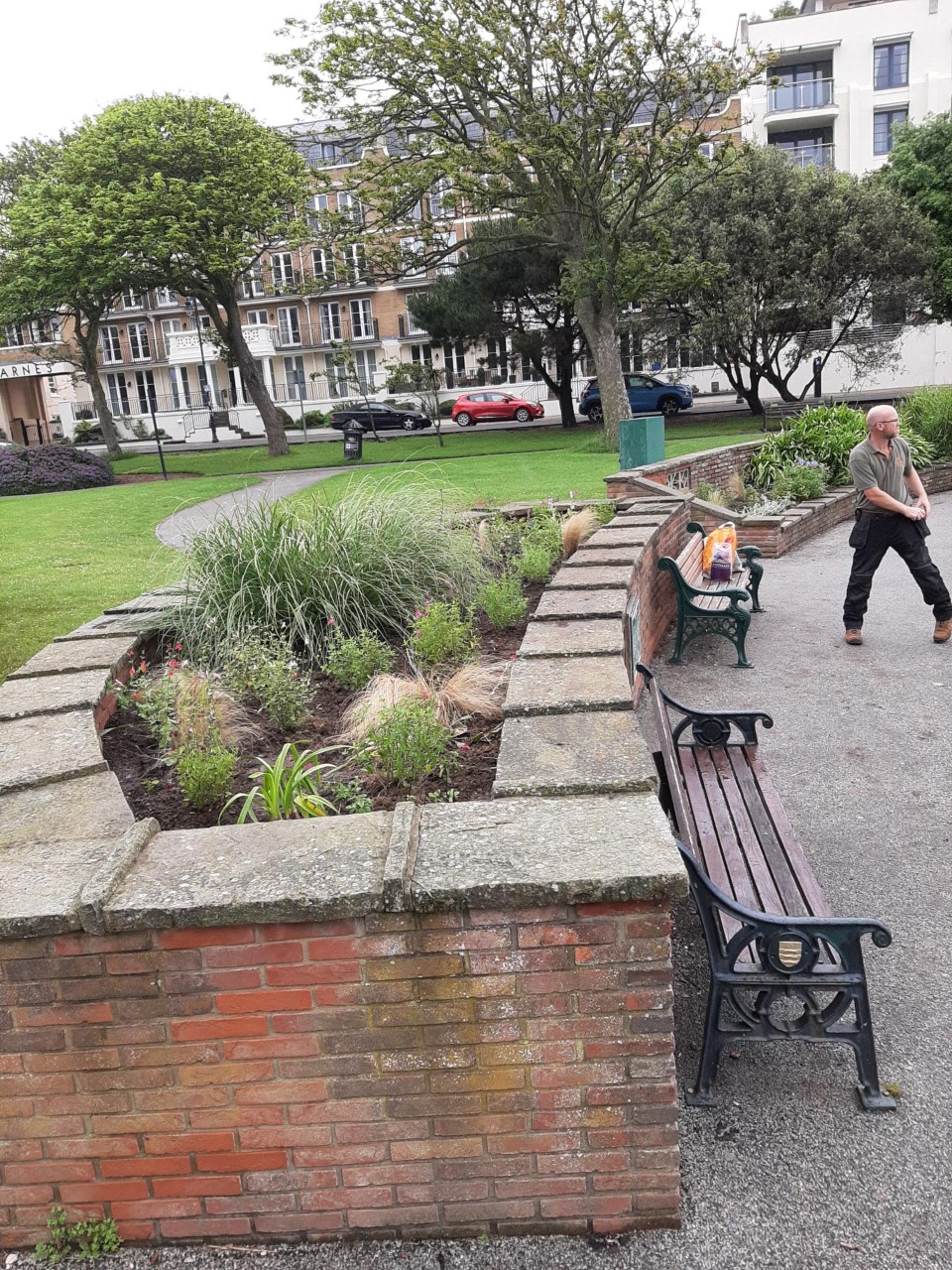
A second planting session is also planned. If you are in the town centre, do take a walk down to Steyne Gardens to admire the team’s work and enjoy the improved setting.
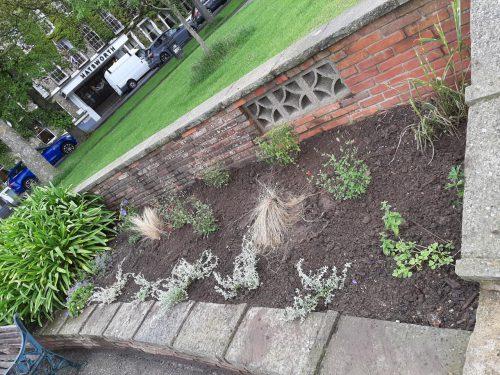
Our Executive Board play an important role in SSW and it’s always interesting to find out more about their background. In this insight we meet Bob Smytherman, who is President of SSW. You might also recognise him as Worthing’s Town Crier!
Name: Bob Smytherman
Lives: Worthing
Have you always lived in Worthing? I born in our family home in Lancing before moving to my own home in Worthing in 1991
How long have you been involved with Sight Support Worthing (SSW)? Since 2012

What’s your role at SSW? President
What do you especially enjoy about your role? I love meeting with our Members at our regular events such as the Burns Lunch or Christmas Party and Volunteers afternoon tea.
Which moments at SSW have you particularly enjoyed?
Being Master of Ceremonies for the Burns Lunch and addressing the Haggis is always a particular highlight as was Chairing the steering group for the lottery project looking in to the history of the charity and visually impaired people in the town.
What do you love about living where you do? I love being close to both the sea and Downs with a great range of shopping and leisure facilities on our doorstep.
How do you spend your free time? I love spending my time as Worthing Town Crier promoting our amazing town and community organisations
Tell us an amazing fact about yourself! I was Milk Monitor at St Mary’s Catholic Primary school in Worthing where I am now a School Governor.
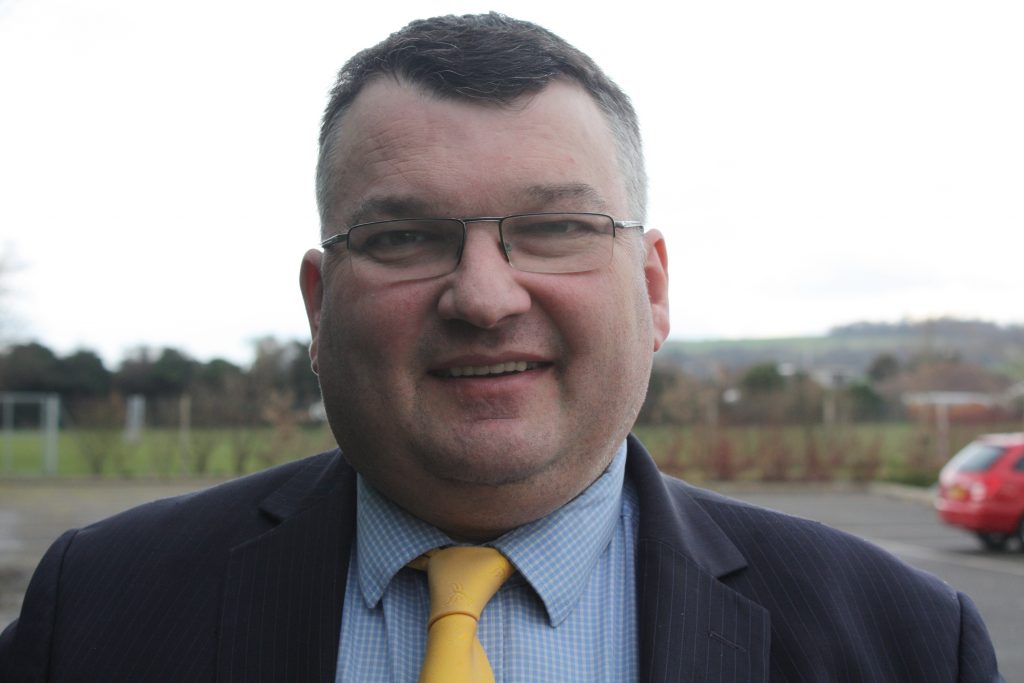
We’d love to hear about your experiences of being out in Worthing and travelling around the town. Good or bad, tell us what has affected your ability to manoeuvre the pavements or access particular facilities.
- Is street clutter making days out hazardous for you or have you been pleasantly surprised?
- Do you use public transport and are there aspects you love and some that could do with changing?
- What improvements would you like to be made to Worthing to make it easier for you, as someone with a visual impairment, to get from A to B?
Staff from Sight Support Worthing will shortly be meeting with a representative from Adur and Worthing Council and we’d love to hear from members (or anyone with a visual impairment, or their carers) who have feedback and suggestions that we can give to the council about making the town more accessible and welcoming for everyone.
Either email us at info@sightsupportworthing.org.uk or give us a call on 01903 235782.
Sight Support Worthing couldn’t function as well as we do without the amazing help and support of our volunteer Sight Supporters. They undertake a range of valuable tasks for us, and they get a real feel-good factor from helping our clients! Each volunteer has their own reasons for giving their time and energy to us, and chances are some of those are listed below. Take a look at some of the brilliant benefits of becoming a volunteer:
Make a difference – yes, there’s no denying it: you will make a difference to everyone involved in Sight Support Worthing or wherever you choose to volunteer. Some days it might be small and help one person, other days you might do something that helps a whole crowd. Either way, you will affect someone, somehow in a positive way.
Gain confidence and build self-esteem – not all of us are as confident as we’d like, and volunteering is a great way to remedy this. Once you start volunteering you’ll begin to get a sense of accomplishment and pride in your achievements, especially when you see the difference you’re making to others. Your confidence and sense of achievement will be boosted even higher if your volunteer role takes you out of your comfort zone.
This self-assurance will then spill over into other areas of your life so you’ll feel more confident and positive at home or work. If you’re shy, putting yourself into unknown (but hopefully welcoming) situations can condition you to find them less scary. Win-win.
Create new connections – whether you come away with a brand new best friend or find somewhere to have a regular chat with friendly faces, you’ll form new connections with like-minded people. If you’re someone who finds life a little lonely at times, volunteering is an excellent way to combat this. Choose somewhere to volunteer where you’ll be amongst people and you’ll be part of a whole new community.
Makes you happier – as humans we’re wired to want to help others, so the brain reacts well to situations when it knows you’re doing that, and makes you feel happier. Choosing a volunteering opportunity that’s right for you will also mean you spend that time having fun – and who doesn’t want an extra bit of fun in their life?!
Sense of purpose – most people choose to volunteer for an organisation or issue that is important to them. By giving your time and energy for free, and helping others achieve something, you’ll be boosting your sense of purpose and with it your feelings of happiness. Studies have shown that volunteering can help with depression, anxiety and other negative feelings by providing that regular sense of purpose and a positive reason to get up and out of the house.
Help with your career – volunteering offers opportunities to learn new skills and many of those will be transferable to other aspects of life including work. It’ll also show any employer that you go above and beyond and take time to help others; who wouldn’t want someone like that working with them? Volunteering is especially good if you’re lacking in work experience as it can provide you with new skills and proof of attributes that can then be added to a CV or used as examples in job interviews. Say you’d like to work in admin… find a volunteering role that will see you helping out with filing, perhaps doing a stock inventory, or maybe sorting out mail. The more you help out, the more you will learn.
So if you score one or more of these benefits while volunteering, you’re on to a winner. Perhaps you’re already volunteering and can add to our list of benefits? What do you gain from being a volunteer?
We’re always on the lookout for people like you to help us in volunteer roles. Take a look at our web page dedicated to volunteering opportunities at Sight Support Worthing or get in touch for a chat.
‘Providing the Jam’ is a fascinating look at the visually impaired community of Worthing, and focuses on the past 100+ years of support that Sight Support Worthing has provided.
The book was written by authors Chris Hare and Lela Tredwell, with support from the Heritage Lottery Fund without whom this project would not have been possible.
The book can be purchased for £4.99 from our centre in Rowlands Road, or through Amazon Kindle, where it is also available for £4.99.






